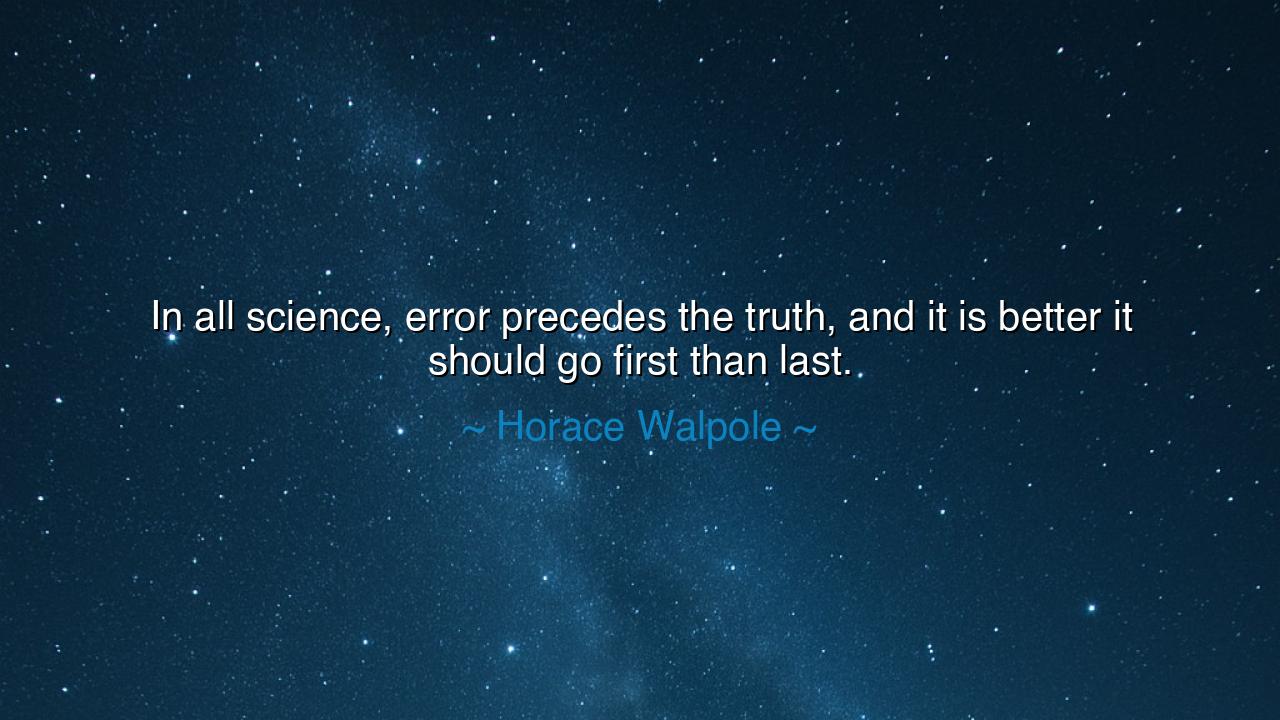
In all science, error precedes the truth, and it is better it
In all science, error precedes the truth, and it is better it should go first than last.






"In all science, error precedes the truth, and it is better it should go first than last." These profound words from Horace Walpole carry with them the deep understanding that in the pursuit of truth, the path is often paved with errors. Walpole’s insight is a recognition of the nature of scientific discovery, a process that requires trial and error, where each mistake brings us closer to the ultimate truth. To err, in this sense, is not a flaw but a necessary part of the journey toward knowledge. Error, like the wind that clears the mist, allows us to see more clearly the true shape of the world around us. Walpole’s reflection teaches us that failure is not something to fear but an essential stepping stone in the process of discovery.
In the ancient world, the pursuit of knowledge was often seen as a battle between what was known and what was yet to be discovered. Socrates, the great philosopher, engaged in a constant dance with ignorance, not fearing to question the very foundations of truth. His method was not about asserting final answers, but about seeking, challenging, and learning through dialogue. Socrates made it clear that knowledge was not a straight path but one full of doubt, where the process of learning required the humility to acknowledge that error is often the precursor to wisdom. The ancients understood that true wisdom comes not from never being wrong, but from being willing to learn from mistakes and seeing each failure as an opportunity to approach the truth from a new angle.
Consider the example of Galileo, the great astronomer whose discoveries revolutionized our understanding of the universe. Galileo’s work on heliocentrism, the idea that the Earth revolved around the Sun, was met with great resistance from the established authorities of his time. His theory was based on observational error—his conclusions were challenged by the prevailing scientific and religious authorities. But Galileo’s mistakes and errors in judgment along the way were part of his process—he did not abandon his search for truth in the face of error. Instead, he learned from it, refining his understanding of the cosmos until his discoveries were irrefutable. Error preceded his breakthrough, and it was through error that Galileo was able to see the universe in a new and clearer light. Walpole’s words resonate with the lesson of Galileo’s life—that error is often the first step on the road to the truth, and that it is better to embrace it early than to allow it to impede progress at the end.
The concept of error preceding truth is reflected in the life of Thomas Edison, who famously said, “I have not failed. I’ve just found 10,000 ways that won’t work.” Edison’s journey to invent the lightbulb was marked by countless mistakes and failures. Each error he made along the way brought him closer to the truth of how to create a practical, lasting light source. If Edison had feared failure or had given up after encountering mistakes, we might never have seen the birth of modern electricity. In this way, error was not the opposite of truth, but its companion—each failure was a lesson, each misstep a necessary part of the process of discovery.
The lesson Walpole imparts to us is that the journey toward truth is non-linear—it is filled with missteps, errors, and revisions. This process can be disheartening, but it is through error that we refine our ideas, sharpen our insights, and move closer to the ultimate truth. This is true not only in science but in life itself. Our personal growth is marked by the many mistakes we make, the times we fall and rise again, learning from each setback. Just as a scientific theory is tested and revised through error, so too are we shaped by our experiences and mistakes. It is the willingness to fail, to experiment, and to keep going despite error that leads to the truths we seek.
In your own life, embrace the errors you encounter, for they are not to be feared or avoided. Instead, see them as opportunities—not for failure, but for learning. Just as Socrates questioned everything in his pursuit of wisdom, so too should you ask questions, challenge your assumptions, and be unafraid to make mistakes in the pursuit of your goals. Walpole’s wisdom invites you to move forward boldly, knowing that error is not a reflection of your failure, but a sign of your engagement in the journey toward truth. Each step, whether it be one of success or failure, brings you closer to understanding, to growth, and to the ultimate truth of your purpose. Progress, both in science and in life, is made through the continual testing, questioning, and refining of ideas.
Thus, let error be your companion as you walk the path of discovery. Know that each mistake, each misstep, brings you closer to the truth, and that it is the very process of learning through failure that forms the foundation for true understanding. Approach every challenge with the mindset of an explorer, seeing the unknown not as something to fear but as something to embrace. Through trial, error, and dedication, you will uncover the truths that will guide you on your journey.






AAdministratorAdministrator
Welcome, honored guests. Please leave a comment, we will respond soon